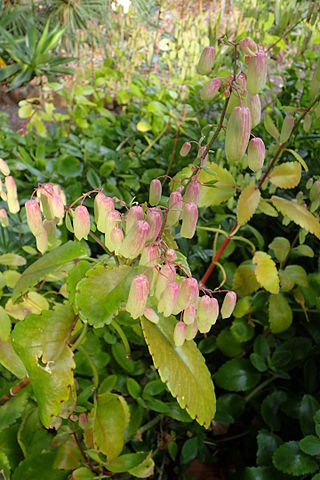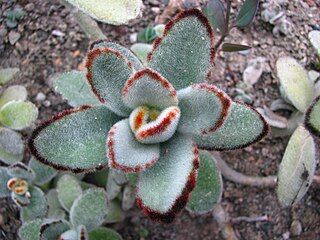
KalanchoeKAL-ən-KOH-ee, also written Kalanchöe or Kalanchoë, is a genus of about 125 species of tropical, succulent plants in the stonecrop family Crassulaceae, mainly native to Madagascar and tropical Africa. A Kalanchoe species was one of the first plants to be sent into space, sent on a resupply to the Soviet Salyut 1 space station in 1979. The majority of kalanchoes require around 6-8 hours of sunlight a day; a few cannot tolerate this, and survive with bright, indirect sunlight to bright shade.

Floriculture is the study of the efficient production of the plants that produce showy, colorful flowers and foliage for human enjoyment and the human environment. It is a commercially successful branch of horticulture and agriculture found throughout the world. Efficient production practices have been developed over the years, for the hundreds of plant taxa used in the floral industry, increasing the overall knowledge of whole plant biology. Plant breeding and selection have produced tens of thousands of new genotypes for human use.

Grevillea, commonly known as spider flowers, is a genus of about 360 species of evergreen flowering plants in the family Proteaceae. Plants in the genus Grevillea are shrubs, rarely trees, with the leaves arranged alternately along the branches, the flowers zygomorphic, arranged in racemes at the ends of branchlets, and the fruit a follicle that splits down one side only, releasing one or two seeds.

Silene chalcedonica, the Maltese-cross or scarlet lychnis, is a species of flowering plant in the family Caryophyllaceae, native to central and eastern Russia, Kazakhstan, Mongolia and northwestern China. Other common names include flower of Bristol, Jerusalem cross and nonesuch.

Kalanchoe beharensis is a plant species in the succulent genus Kalanchoe, and the family Crassulaceae. Kalanchoe beharensis is native to Madagascar known by local names mongy, rongy and tavitavy.

Dichorisandra thyrsiflora or blue ginger is a species of tropical flowering plant which resembles ginger in growth and habit, but is actually related to the spiderworts. The plant is native to the tropical woodlands of North, Central and South America, especially in Atlantic Forest vegetation in Brazil. Of the family Commelinaceae, it is cultivated for its handsome spotted stems and large shiny foliage which is held horizontally, surmounted by striking blue flowers.

Halimium is a genus of 12 species of evergreen or semi-evergreen subshrubs in the family Cistaceae, closely related to Cistus. They are native to Europe, North Africa and Asia Minor, with the centre of diversity in the western Mediterranean region.

Kalanchoe thyrsiflora is a species of flowering plant native to Botswana, Lesotho, South Africa and Eswatini. This plant is rare in cultivation, and those plants labelled as "Kanlanchoe thyrsiflora" in horticulture are mostly another similar species, Kalanchoe luciae.
Paddle plant or flapjacks may refer to:

Symphyotrichum ericoides, known as white heath aster, frost aster, or heath aster, is a species of flowering plant in the family Asteraceae native to much of central and eastern North America. It has been introduced to parts of Europe and western Asia.

Allium cristophii, the Persian onion or star of Persia, is a species of flowering plant in the family Amaryllidaceae, native to Iran, Turkey, and Turkmenistan, though grown as an ornamental bulbous plant in many parts of the world. It may be sold under the synonym of Allium albopilosum.

Cotyledon orbiculata, commonly known as pig's ear or round-leafed navel-wort, is a South African succulent plant belonging to the genus Cotyledon.

Kalanchoe blossfeldiana is a herbaceous and commonly cultivated house plant of the genus Kalanchoe native to Madagascar. It is known by the English common names flaming Katy, Christmas kalanchoe, florist kalanchoe and Madagascar widow's-thrill.

Kalanchoe pinnata, commonly known as cathedral bells, air plant, life plant, miracle leaf, and Goethe plant is a succulent plant native to Madagascar. It is a popular houseplant and has become naturalized in tropical and subtropical areas. The species is distinctive for the profusion of miniature plantlets that form on the margins of its leaves, a trait it has in common with some other members of Bryophyllum.

Symphyotrichum lateriflorum is a species of flowering plant in the aster family (Asteraceae). Commonly known as calico aster, starved aster, and white woodland aster, it is native to eastern and central North America. It is a perennial and herbaceous plant that may reach heights up to 120 centimeters and widths up to 30 centimeters.

Kalanchoe manginii, beach bells, is a species of flowering plant in the family Crassulaceae, native to Madagascar. It is an evergreen succulent perennial growing to 30 cm (12 in) tall and wide, with arching branches of rounded, glossy leaves, and urn-shaped salmon-red flowers in spring. As the minimum temperature for growth is 10 °C (50 °F), in temperate regions this plant must be grown under glass as a houseplant.

Kalanchoe marmorata, the penwiper, is a species of flowering plant in the family Crassulaceae, native to Central and West Africa, from Zaire to Ethiopia, Sudan and Somalia. It is an erect or decumbent succulent perennial growing to 40 cm (16 in) tall and wide, with glaucous leaves spotted with purple, and starry white, four-petalled flowers, sometimes tinged with pink, in spring. As the minimum temperature for cultivation is 12 °C (54 °F), in temperate regions it is grown under glass as a houseplant.

Kalanchoe pumila, the flower dust plant, is a species of flowering plant in the stonecrop family Crassulaceae, native to Madagascar. Growing to 20 cm (8 in) tall and 45 cm (18 in) wide, it is a spreading, dwarf succulent subshrub with arching stems of frosted leaves, and clusters of purple-veined pink flowers in spring. As the minimum temperature for cultivation is 12 °C (54 °F), in temperate regions it is grown under glass as a houseplant.

Kalanchoe tomentosa, also known as pussy ears or panda plant, is a succulent plant in the genus Kalanchoe. A native of Madagascar, Kalanchoe tomentosa has many different cultivars such as 'Chocolate Soldier', 'Golden Girl', 'Black Tie' and 'Teddy Bear'. It has red-rimmed leaves.






























